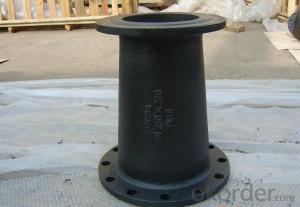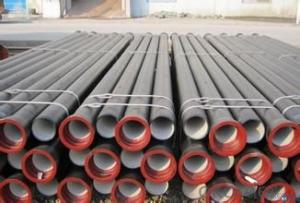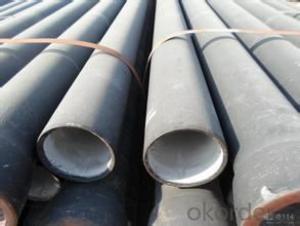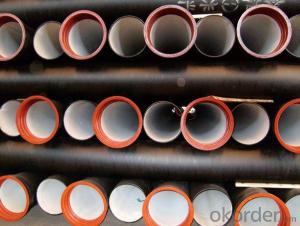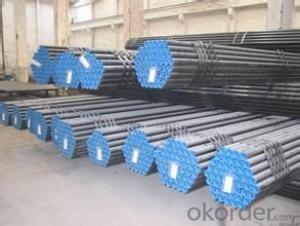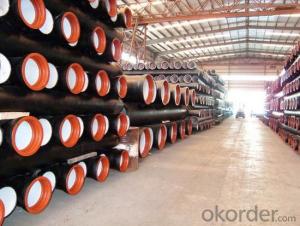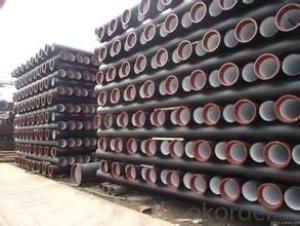Ductile Iron Pipe Model:T type / K type / Flange type Length: 6M
- Loading Port:
- China main port
- Payment Terms:
- TT OR LC
- Min Order Qty:
- 500 m
- Supply Capability:
- 100000 m/month
OKorder Service Pledge
OKorder Financial Service
You Might Also Like
1.Ductile Iron Pipe Description :
1) Pipes confirm to ISO2531,K9 class,T type joint,6m long,with inside cements lining conform to ISO4179, outside Zinc
spraying(130g/m2) and bitumen coating(70μm) conform to ISO8179.
2) Pipe ends: Spigot and socket ends, with 100% SBR rubber gaskets accoding to ISO4633
3) we can do third party inspection according to customer's request.
2.Main Features of the Ductile Iron Pipe:
•High yield strength
•High tensile Strength
•High corrosion resistance
•Pressure Resistence
•Anti-corrosion
3.Ductile Iron Pipe Images:
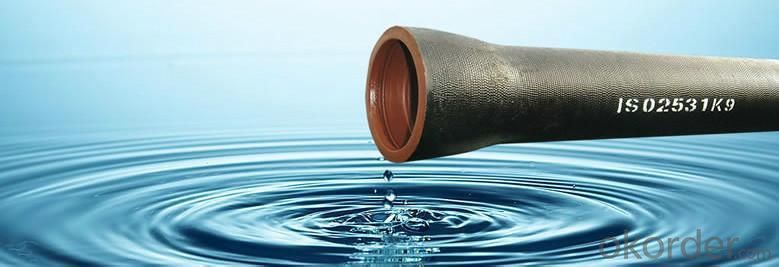
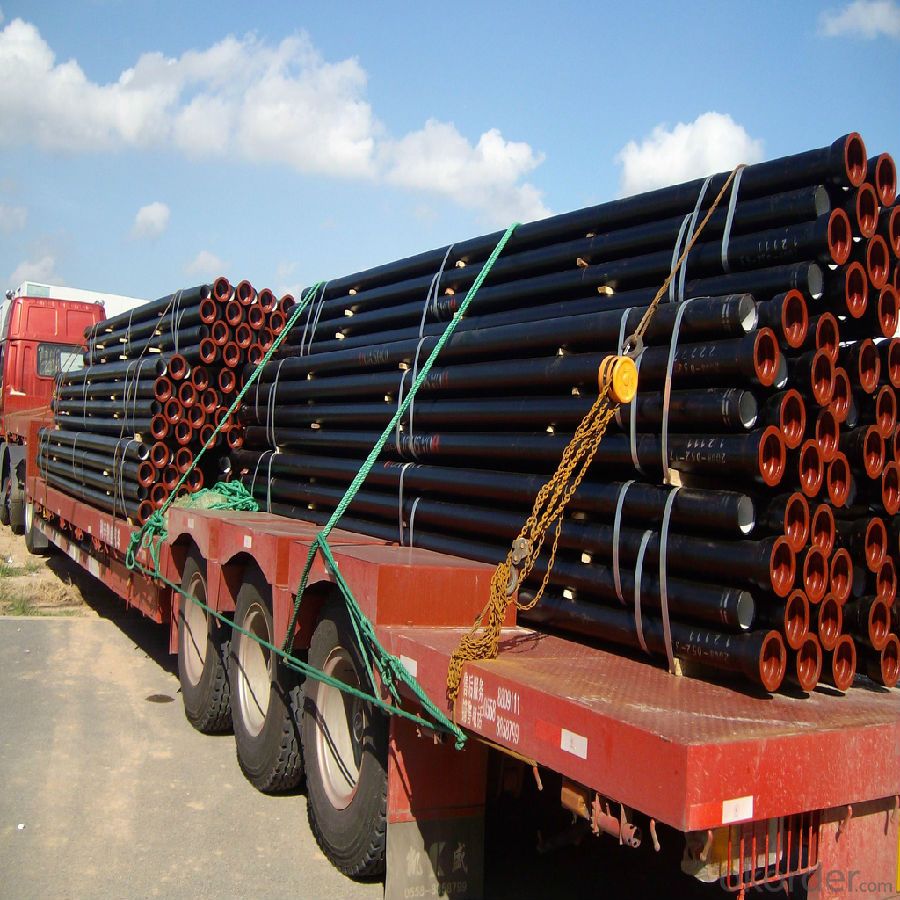
4.Ductile Iron Pipe Specification:
Place of Origin: China (Mainland)
Model Number: DN80-1600
Length: 6M/5.7M/NEGOTIATED
Standard: ISO2531 / EN545
Application: Potable/Sewage Water
Diameter: DN80-1600
Shape: Round
Hardness: 230
Pipe Wall Thickness: standerd
Pull Strength: 420
Yield (≥ MPa): 300
5.FAQ:
We have organized several common questions for our clients,may help you sincerely:
1.Q: Why would you choose ductile iron pipe rather than other pipe materials?
A:The reasons are obvious for that not only ductile iron pipe possesses the inherent strength and flexibility of ductile iron, combined with proven corrosion protection systems, but also the cost savings can be achieved from design to installation and commissioning.
2.Q:Why can you guarantee the inner of pipes can’t be corroded?
A: High alumina cement mortar lining and sulphate-resistant cement mortar lining. These two special linings are applicable to inner anti-corrosion for sewage pipes, improving resistance to erosion of the sewage components.
- Q: Ways of connecting ductile iron pipes
- In our country, the national standards stipulated annealing, centrifugal casting, water delivery with ductile iron, straight pipe, pipe fittings, aprons and other technical requirements, China's production of ductile iron pipe products must meet the current national standards.
- Q: What are the specifications of cast iron pipes?
- The nominal diameter of the continuous grey cast iron pipe is 75~1200 mm. It adopts the form of socket type or flange disk interface. It can be divided into two kinds of flexible interface and rigid interface according to function. The length of the straight pipe is 4 meters, 5 meters and 6 meters. According to the wall thickness, LA, A and B are divided into three grades. The nominal diameter of the centrifugal cast iron pipe of the sand mould is 200~1000 mm, the effective length is 5 meters and 6 meters. According to the wall thickness, it is divided into two grades: P and G. High strength, good toughness, thin tube wall, little metal consumption, and can bear higher pressure,
- Q: What is the acceptance of cast iron pipe material?
- Specific acceptance, first of all in line with national standards, followed by the provisions of the contract, and then the project requirements. General contract and drawings will have the requirements and standards of pipe. I hope I can help you.
- Q: What is the expected fatigue life of ductile iron pipes under cyclic loading?
- The expected fatigue life of ductile iron pipes under cyclic loading can vary depending on various factors such as the magnitude and frequency of the cyclic loading, the quality of the material, the design and installation of the pipes, and the environmental conditions. Ductile iron is known for its high strength and ductility, which enables it to withstand cyclic loading to a certain extent. However, like any other material, it is also susceptible to fatigue failure over time. To estimate the expected fatigue life of ductile iron pipes, engineers often utilize fatigue analysis and testing methods. These methods involve subjecting representative samples of the pipes to cyclic loading under controlled conditions and measuring the number of cycles required for failure to occur. The results of these tests are then used to extrapolate the expected fatigue life of the pipes under similar loading conditions. It is important to note that the expected fatigue life can vary significantly depending on the specific conditions and loading patterns experienced by the pipes in a given application. Therefore, it is crucial to consider factors such as the operational demands, maintenance practices, and the overall structural integrity of the pipeline system. Additionally, the use of appropriate design standards and guidelines, along with regular inspection and maintenance, can help enhance the fatigue life of ductile iron pipes. In summary, while it is challenging to provide a specific value for the expected fatigue life of ductile iron pipes under cyclic loading, engineers can estimate it through fatigue analysis and testing methods. It is essential to consider various factors and maintain the pipes properly to ensure their longevity and prevent potential failures.
- Q: Can ductile iron pipe be used for chemical processing plant applications?
- Yes, ductile iron pipe can be used for chemical processing plant applications. Ductile iron is a type of cast iron that has enhanced properties, such as improved ductility and strength, which make it suitable for a variety of industrial applications, including chemical processing plants. Ductile iron pipes have good corrosion resistance, can withstand high temperatures and pressures, and are able to handle aggressive chemical substances. Additionally, ductile iron pipes are easy to install and maintain, making them a cost-effective choice for chemical processing plants. However, it is important to consider the specific requirements and conditions of the chemical processing plant when selecting piping materials, and consult with experts to ensure that the chosen materials are suitable for the specific chemical processes and substances involved.
- Q: Will nodular cast iron pipes rust?
- Qualified ductile iron pipe requires lining standard cement. The outer wall of pipe needs spraying zinc treatment and asphalt paint coating, and other epoxy resin paint can also be selected. Qualified ductile iron pipes can be used for more than a hundred years. The main place where rust is easily exposed is where the outer wall meets the soil because of its high humidity and high oxygen content. Qualified anticorrosion can effectively resist rust, its process principle can not give you the details.
- Q: Luo what effect of ductile cast iron
- Chromium is an anti graphitization element, which hinders the graphitization process of cast iron, increases the content of cementite (Fe3C) in the internal structure of cast iron, and stabilizes pearlite at the same time. It affects the mechanical and processing properties of nodular cast iron.
- Q: What are the risks in the process of conveying ductile iron pipes?
- Pile up: when the pipe is stacked, the lower part of the pipe should be covered with a tie or cushion block. The socket of the pipe is interlocked with each other, and the stop wedge must be put in place to prevent the pipe from rolling. Not allowed to be piled on marshes, rough slopes, or badly polluted areas.
- Q: How do ductile iron pipes perform in high-temperature steam applications?
- Ductile iron pipes are known for their exceptional performance in high-temperature steam applications. They have the ability to withstand elevated temperatures and maintain their structural integrity, making them highly suitable for use in steam distribution systems. One key advantage of ductile iron pipes in high-temperature steam applications is their excellent thermal conductivity. This property allows for efficient heat transfer, ensuring that the steam is delivered at the desired temperature without significant loss. The high thermal conductivity of ductile iron also helps to minimize the risk of thermal expansion and contraction, which can lead to pipe failure or leakage. Furthermore, ductile iron pipes have a high melting point, typically around 2000°F (1093°C), which makes them resistant to the extreme temperatures encountered in steam applications. This ability to withstand high temperatures without deformation or structural failure ensures the reliability and longevity of the piping system. Another important factor contributing to the performance of ductile iron pipes in high-temperature steam applications is their corrosion resistance. These pipes are typically coated with epoxy or other protective materials to prevent corrosion and maintain their structural integrity even in aggressive steam environments. This corrosion resistance helps to ensure that the pipes can withstand the harsh conditions and operate efficiently over an extended period. In summary, ductile iron pipes are well-suited for high-temperature steam applications due to their excellent thermal conductivity, high melting point, and corrosion resistance. These properties make them a reliable and durable choice for steam distribution systems, ensuring the safe and efficient transport of steam at elevated temperatures.
- Q: Are ductile iron pipes suitable for use in sewage pumping stations?
- Yes, ductile iron pipes are suitable for use in sewage pumping stations. Ductile iron pipes are known for their durability, strength, and excellent corrosion resistance, making them an ideal choice for wastewater applications. They can withstand the high pressures and abrasive characteristics of sewage systems without any significant degradation or loss of performance over time. Additionally, ductile iron pipes have a smooth interior surface, which helps to minimize friction losses and prevent blockages. Furthermore, ductile iron pipes have a long lifespan and require minimal maintenance, reducing overall operating costs. Therefore, due to their various advantageous properties, ductile iron pipes are highly suitable for use in sewage pumping stations.
Send your message to us
Ductile Iron Pipe Model:T type / K type / Flange type Length: 6M
- Loading Port:
- China main port
- Payment Terms:
- TT OR LC
- Min Order Qty:
- 500 m
- Supply Capability:
- 100000 m/month
OKorder Service Pledge
OKorder Financial Service
Similar products
Hot products
Hot Searches
Related keywords












